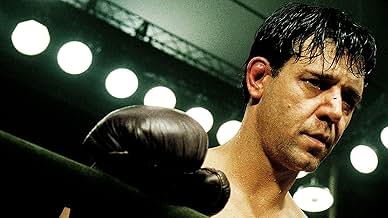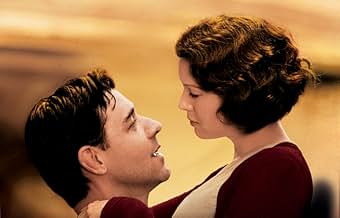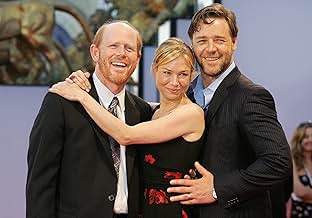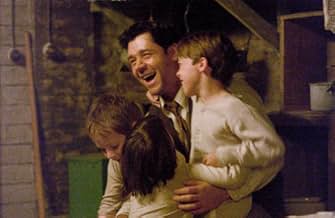The true story of James J. Braddock, a supposedly washed-up boxer, who returned to the spotlight to win the heavyweight championship of the world.The true story of James J. Braddock, a supposedly washed-up boxer, who returned to the spotlight to win the heavyweight championship of the world.The true story of James J. Braddock, a supposedly washed-up boxer, who returned to the spotlight to win the heavyweight championship of the world.
- Nominated for 3 Oscars
- 16 wins & 45 nominations total
Featured reviews
What I say in the last paragraph is actually the reason I give the film 8 stars instead of 9 or 10, because the reputation and memory of a real person was so unjustly sullied. Now for what is right with the movie. It realistically portrays the violence of poverty, especially during the Great Depression when there was no real safety net for the poor. Kids went hungry, families were split up because parents couldn't afford to feed them, fighting for the right to unionize could get you killed. Great work went into the art design and cinematography of this film.
Russell Crowe and Renee Zellweger give very poignant and authentic portrayals of Jim and Mae Braddock, trying to keep their familiy together during the time when Jim cannot fight and can't get reliable work on the docks either. It's a great comeback story, and I think it might have done better at the box office and been better remembered if it had been released at Christmas of 2005 rather than during the summer, as it was. It is the real "Rocky" story, and I highly recommend it.
But this one has Russell Crowe in it. And that makes all the difference.
It is not that Renee Zellwegger and Paul Giamatti, Paddy Considine, Bruce McGill and Craig Bierko, among others, give less than stellar performances: they all live up to their justifiably great reputations. You have to believe they are at the top of their game. But for all of Russell Crowe's reputation for being "difficult", it is hard to think of actors who can equal his personal force on the screen. He is brilliant.
Ron Howard has made of the real life of Depression-era prize-fighter James J. Braddock a work of art. The camera work is phenomenal. Without using violins or cliché' pull-back shots showing the numbers of people homeless and in soup lines, Howard makes the Depression a visceral reality with scenes of near-hopeless men at the docks, pleading for a day's work; a stolen salami; Crowe's giving his daughter his breakfast piece of bologna, telling her he dreamed he was full. The bleakness of the times is the graininess and the sepia/greyness of the camera shots; the images are stark but completely descriptive. Crowe as Braddock with hat in hand and tears in his eyes, begging for twenty dollars so he can get his children back into his home, is the personification of pride sacrificed to desperation. But when Braddock is later asked at a press conference why he is fighting at his age and after so many poor showings, all he has to say is "milk" to be supremely eloquent.
Doubtless many people know the history of James Braddock, and know the outcome of his fights, including the championship bout with Max Baer, who had already killed two men in the ring. If you don't know, DON'T look it up before you see the movie, and if you DO KNOW, DON'T TELL, but go. Analogous to watching Howard's film "Apollo 13", you may know the outcome, but there's wonderful suspense in the details. These were among the most exciting last twenty minutes I've seen on film. I didn't expect to be able to watch, but like Braddock's terrified wife Mae, I was unable to tear myself away.
The audience was like a prize fight audience, cheering, booing, gasping, groaning during the fights. We applauded Braddock's wins, suffered his defeats. It is a great movie, with authentic heart. Solid A.
The cast is perfect and, under Ron Howard's confident hand, all give amazing performances. Russel Crowe's soulful performance puts him back in Maximus territory here and, boy, was this cat born to play these types of roles. Bruce McGill is in it (San Antonio, represent!!!) and that's always a good thing.
My only complaint (if it can be called that) is that the boxing sequences break no new ground. They are very reminiscent of the boxing sequences in Raging Bull. They are so well executed, however, that I quickly forgot about this small nitpick.
The script works on so many levels, it's not even funny. There is plenty of time devoted to character development and it pays off handsomely in the long run as we really care about Jim Braddock every time he steps in the ring.
All in all, Cinderella Man is a rousing, classy film that utterly satisfies.
These films share in common not just a documentary-like approach to boxing or a superficial biopic. They also portray the human side of a modern gladiator and the culture that produced him. In the case of "Cinderella Man," we are given a detailed and heart-rending portrait of the Great Depression in American. The story of the gentleman pugilist James J. Braddock is the backdrop to the larger drama of Americans' struggle in the 1930s.
Russell Crowe provides a brilliant interpretation of Braddock, capturing the decency of a man whose career as a boxer would appear to have peaked at just the wrong time prior to the Crash of 1929. After that momentous event, Braddock's boxing went into decline just like the lives of millions of Americans. The scenes of Braddock and his family living in squalid conditions and with uncertainty about such basics as heat and electricity were carefully developed in the film. Renée Zellweger was outstanding as Mae, the caring but feisty wife of Braddock. Paul Giamatti was also excellent as Braddock's handler-manager, Joe Gould. Joe tries to keep up appearances by sporting fancy clothes. But in one revealing scene in the film when we see the interior of Joe's ostensibly swanky apartment, there is no fancy furniture other than a dowdy table and some flimsy deck chairs. Everyone is reeling from the Depression. In the depiction of the massive unemployment, the "Hoovervilles" of the homeless residing in Central Park, and the desperate need for Americans for an optimistic icon like Braddock to raise their spirits, the film truly captured the tragedy of the Great American Depression.
The film's director Ron Howard emphasized close-ups throughout the film with uneven results. In many of the boxing sequences, the close-ups and rapid editing made it difficult tell the fighters apart. The close-ups continued even into the domestic scenes and the outdoor sequences depicting Braddock working as a longshoreman. The film's dark cinematography conveyed the bleakness of the Depression years, but it worked against bringing out the buoyant spirit of Braddock himself and the optimism that he instilled in others. As a director, Howard's strength is not in film artistry or technique. As apparent in this and other films, his gift lies in narrative storytelling and the development of dramatic character.
Indeed, the characters and the story were the strong points of "Cinderella Man." Much credit should go to Cliff Hollingsworth for a screenplay that included thoughtful dialogue, humor, and multi-dimensional characters. Daniel Orlandi also merits praise for the brilliant costumes that helped to recreate the period of the early 1930s.
But the heart of this film experience is Russell Crowe's screen portrayal of Braddock. It was the colorful sportswriter and raconteur Damon Runyan who coined the nickname of "Cinderella Man" for Braddock. However, the real James J. Braddock was more than lucky. It was his strength of character in and out of the ring that captivated America. One of the most moving scenes of the film was a heated argument between Braddock and his wife Mae where Braddock insists that even in the most difficult of times, he would refuse to be separated from his children. As a boxer, he was fearless. But he demonstrated even more courage in fighting for family valuesa lesson from which we can learn a great deal today in reflecting on this sensitive film.
Jim Braddock was a depression-era boxer who everybody thought was down for the count. Though there is a lot of boxing in this film, this is not a boxing movie, but rather his story and the story of the family that inspired him to fight back against prejudice and hopelessness, to rise to heights that would inspire a nation. Braddock is portrayed in a moving and powerful manner, with remarkable performances all around, one of the best scripts I can remember in recent years, and occasionally brutal action.
Those who have run into my reviews may note that this is one of my shortest. Please understand that I really don't think there's much to say about this simple, beautiful and very human story, besides - see it!
Did you know
- TriviaTo film the final fight, the seats were filled with 15,000 blow-up dummies with masks and hats.
- GoofsThe receipt that Jimmy Braddock gives at the welfare office is about $50 off from the actual amount that Braddock had borrowed. Russell Crowe pointed this out to the director who decided to 'leave it in to prove that it's just a movie'.
- Quotes
Jim Braddock: You think you're telling me something? Like, what, boxing is dangerous, something like that? You don't think working triple shifts and at night on a scaffold isn't just as likely to get a man killed? What about all those guys who died last week living in cardboard shacks to save on rent money just to feed their family, 'cause guys like you have not quite figured out a way yet to make money off of watching that guy die? But in my profession - and it is my profession - I'm a little more fortunate.
- Crazy creditsBefore the title appears the following: "In all the history of the boxing game, you'll find no human interest story to compare with the life narrative of James J. Braddock." - Damon Runyon (1936)
- ConnectionsFeatured in HBO First Look: Cinderella Man (2005)
- SoundtracksShim-Me-Sha-Wabble
Written by Spencer Williams
Performed by Miff Mole and His Molers
Courtesy of Columbia Records
By arrangement with Sony BMG Music Licensing
Details
Box office
- Budget
- $88,000,000 (estimated)
- Gross US & Canada
- $61,649,911
- Opening weekend US & Canada
- $18,320,205
- Jun 5, 2005
- Gross worldwide
- $108,539,911
- Runtime2 hours 24 minutes
- Sound mix
- Aspect ratio
- 2.39 : 1
Contribute to this page







































